
We kindly inform you that, as long as the subject affiliation of our 300.000+ articles is in progress, you might get unsufficient or no results on your third level or second level search. In this case, please broaden your search criteria.


Every Saturday for a period of two months, from the beginning of April till the end of June 1992, sessions organized by the Belgrade Circle were held at the Student Cultural Centre in Belgrade. At these sessions, ten in all, intellectuals, members of the Belgrade Circle and their quest – distinguished writers, scientists, artists, journalists, film and theatre directors, architects, actors, interpreters – expressed their own views of another, radically different Serbia. In times of anguish and affliction, the meetings, attended by a large assembly of listeners experiencing a kind of moral purification, were nonetheless imbued with a frail hope that there still might be a chance for a turn in events. With a desire to present ideas, opinions and sensations shared by the participants of the Belgrade Circle sessions to a much larger audience, the reading public, and to preserve them, because of their merit, in a more lasting form, discussions of over eighty intellectuals were compiled to form this book. In the meantime, the overwhelming disaster has reached its climax: »The Bosnian War«, still raging with no feasible way out as yet, exploded and blazed up like fire. The Belgrade Circle participants, distressed and abashed at the display of all those real or imagined evil deeds, so eagerly reported by the portentous heralds of death voiced hitherto often deeply hidden and silent feelings and thoughts about their burdensome disgust at the plague gripping and afflicting us all. Each participant contributed in his or her own way – rigorous scientific analysis, artistic susceptibility, eyewitness accounts, or simply. A public-minded desperate wail – to the shaping of one new, public opinion, the one that stirred in that sad Spring of ’92 and rebelled against the general fear, animosity, devastation, extermination, ethnic cleansing, forcible population exchanges... All those responsible and public-minded citizens, holding different political opinions, some members of various political parties, with incomparable personal experiences, varied professional interest and often of »objectionable« national origin, showed, however the will to insert tolerance among the basic principles of a humanized way of fife. But, in spite of the pronounced differences, their common aim, discernable in each and every speech imported to the audience, was to finally establish a community based on simple but as yet still unattainable ideals such as peace, freedom, tolerance and justice in place of degrading political, national and religious exclusiveness. Participants focussed their attention on various aspects of the problem: some analysed the roots of hatred and evil; some indicated the disastrous consequences of irresponsible national myth revivals; others warned of menaces yet to come unless we see reason in time. Some were stern, others witty and others still perhaps too prone to pathos, but they were all deeply concerned, and, as it unfortunately turned out, correct in predicting subsequent events. Therefore, individuals who take no notice of current, official policy and who have for a long time now tenaciously refused to render their talent and knowledge to the needs of the authorities, gathered round a project titled »Another Serbia«. Instigating a state of war and providing alleged erudite justification for the necessity of mutual extermination in the name of some noble goals, vague even to the very massacre executors, must not and cannot be the vocation of anyone who considers him or herself an »intellectual«, or earns a living acting as one. Hence, all session participants had but one desire: to mark out a path that may lead into a more promising future, to another, different, better and happier Serbia. »Another Serbia« soon became the synonym of resistance to fabricated lies, nationalistic madness, criminal war, a fascist holocaust, senseless destruction of villages and cities. Thanks are also due to the daily newspaper »Borba« which regularly reported on the Belgrade Circle Saturday sessions, and published a number of contributions presented there... We hope that the Another Serbia we all aspire to be easily discernable in the collection of essays presented in this book. The reader who hopes to find traces of at least some political program will be gravely disappointed. At present, when politics have poisoned the very soul of so many men of letters and knowledge, and when, among the most violent oppressors, in the ranks of all mortal enemy groups, one finds so many proud bearers of scientific degrees, who may actually be designated as men of unmerited and easily squandered reputation, it has become somewhat indecent to praise »intellectual pursuits«. The Belgrade Circle was, however, founded early in 1992 with the aim of retrieving dignity – another dangerous quality! – to public speech and conceived plans of action for the benefit of truth. We do not take an elitist position and stand indifferently above the crowd. On the contrary, being deeply involved and concerned, we place ourselves in its midst. The Association of Independent intellectuals insists upon its main goal, as declared in the program, namely, to bring together »critically oriented public figured who wish to unite their own civil and intellectual engagements with those of other, basically similarly oriented people«. That is why the Belgrade Circle will continue to »promote ideas, deeds and activities that affirm the values of a democratic, civil and plural society...« The Belgrade Circle will »encourage free and critical thought in all spheres of public life. It will support and help institutions and individuals who resist violence and animosity, and who plead for dialogue and for the survival of culture as the only humanly valid way of life«. Fine speeches? Maybe. Nevertheless, the Belgrade Circle has already, and despite many organizational and financial hardships, as well as ugly and unjust abuse from people who should have been, by the very nature of their vocation, in our ranks had they not knuckled under the burden of a more noble – national to be sure – mission, gained an undeniably high reputation. The words uttered with the aim of promoting »Another Serbia« and presented in this book to serve at testimony to the existence of a number of sensible people, shrewd and brave enough to resist suffocation by overwhelming absurdity, were not the only »weapon« used by Belgrade Circle members. They had also an active part in numerous civil and peace movements and events, thus contributing to the establishment of critical public opinion in Belgrade and Serbia: let us recall, for instance, the sad candles and our wake in the park, with souls colder than the Belgrade frost, while one of the past infernal wars – God, which one was it? – was raging out there somewhere; let us recall the »Black Band«, »Yellow Band«, »Student Protest ‘92«, and our endeavours to bring the people of Hrtkovci (»Srbislavci«) to reason; let us recall our guests from Pljevlja, Montenegro, Bosnia... All the time we were just launching our unhappy and, we believe, noble, though perhaps futile venture the very first participant said: let the Belgrade Circle begin it’s work! We hope that by offering this book to the public we have already come a long way.
More...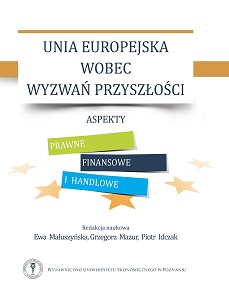
Zarówno w przedlizbońskim, jak i obecnym stanie prawnym wspólna polityka zagraniczna i bezpieczeństwa, jako płaszczyzna współpracy w ramach Unii Europejskiej, wyróżniała się i nadal wyróżnia na tle innych rodzajów polityki prowadzonych w traktatowych ramach tej organizacji. Najważniejsze kierunki ewolucji WPZiB wytyczyły dwa traktaty, a wiec traktat amsterdamski i traktat lizboński. Ten ostatni zasadniczo zmienił usytuowanie WPZiB w ramach UE, co wiązało się z likwidacją charakterystycznej, trójfilarowej konstrukcji prawnej UE oraz z istotnymi zmianami instytucjonalnymi w jej strukturze. Specyfika współpracy w ramach WPZiB spowodowała jednak, że została ona wyraźnie wyodrębniona zarówno z całego katalogu pozostałych unijnych rodzajów polityki, jak i z całej grupy działań zewnętrznych Unii.
More...
W ramach wspólnej polityki zagranicznej i bezpieczeństwa Unia Europejska stosuje sankcje mające wspomóc egzekwowanie jej celów, a zwłaszcza przestrzegania praw człowieka, demokracji i praworządności. Celem artykułu jest analiza skuteczności polityki sankcji Unii Europejskiej wobec Islamskiej Republiki Iranu. Zastosowaną metodą badawczą jest analiza porównawcza. Pierwsza część artykułu została poświęcona teoretycznemu ujęciu sankcji oraz czynnikom mającym wpływ na ich skuteczność. W następnym opisano podstawy systemowe wspólnej polityki zagranicznej i bezpieczeństwa Unii Europejskiej oraz zastosowanie sankcji jako jej elementu. W trzeciej części przedstawiono próbę oceny efektywności unijnej polityki sankcji wobec Iranu.
More...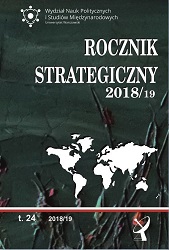
The aim of this article is to analyze the conflicts which were ongoing in 2018,in Yemen and Africa. The selection of armed conflicts was made on the basis ofthree main criteria: intensity, i.e. the scale of battle-deaths; internationalization, i.e.military involvement of third countries; the activities of jihadist groups. The articlediscusses armed conflicts in the Sahel region and the Lake Chad, in Libya, Somalia,and Yemen. As part of the Strategic Yearbook series that reviews current armedconflicts, this study is a continuation of the analyses from previous years. Its purposeis to explore the conditions and dynamics of the 2018 armed conflicts and theirimplications for international security. It explains the reasons of their increasingintensity and internationalization. The expansion of jihadist groups, especiallythose related to IS (Islamic State of Iraq and Levant, the so called Islamic State) orAl-Qaeda (AQ), is perceived as an important factor in this regard. It is argued thatthe activity of armed jihadist groups leads also to greater military involvement ofWestern states.
More...
The article offers an analysis of the most important energy market trends from theperspective of their importance for energy security and climate change. The energyand climate systems are two areas of human activity strongly influencing each other.On the one hand, the way energy is produced and consumed influences the globalclimate system, on the other hand, climate policy impacts energy security. The articletherefore focuses on the directions and dynamics of changes taking place in theenergy sector and which are of particular importance for global reductions of CO2emissions. It gives an insight into the policies of the world’s largest consumers offossil fuels and into the extent to which their activities favour energy transformation.This analysis critically assesses the feasibility of achieving the global climate policytargets set in 2015 in Paris. Especially importantly for the Strategic Yearbook, the2018 events and current trends serve as points of reference: the article outlines theconditions and results of climate negotiations of COP24 held in Poland and thenewest IPCC report on Global Warming of 1.5°C. An analysis of demand-supplytrends, recent trends in the area of CO2 emissions as well as current events leads toconclusions concerning some long-term challenges for energy and climate security.
More...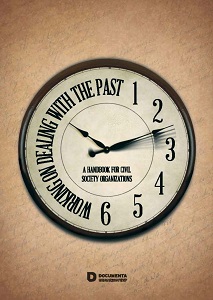
When talking to people from different sides of social divides, I have witnesses the fact that piety to ‘their’ victims is needed in order to establish normal relations with the living. As a child, I heard a neighbour, who lost her husband, saying that she expected the public not only to talk about fascist camps, such as Gonars to which my grandfather was taken from occupied Ljubljana in 1942, but also of prisons such as the one in which she herself was imprisoned after WWII in 1945. She wished that her suffering, from the hands of repressive institutions of that time, to be also remembered. Today we remember that some soldiers, who themselves were victims of Nazi crimes and prosecuted as partisans and communists, after the war became themselves violent prosecutors and torturers. Although emphasizing piety to all innocent victims is slowly becoming a widely accepted standard of political correctness, few countries have approached the ideal of overcoming divisions into ‘our’ and ‘their’ victims, in which conditions have been met to investigate circumstances of death and memory of all who had suffered.
More...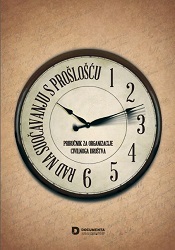
U razgovorima s ljudima s različitih strana društvenih podjela uvjerila sam se kako je za normalizaciju odnosa prema živim a neophodan pijetet prema ‘njihovim ’ žrtvama. Još u djetinjstvu čula sam od susjede koja je izgubila muža kako očekuje da se u javnosti ne govori samo o fašističkim logorima, poput Gonarsa u koji je iz okupirane Ljubljane 1942. odveden moj djed, nego i o zatvoru u kome je poslije Drugog svjetskog rata 1945. bila zatvorena i sama. Željela je da i njena patnja u rukama tadašnjih represivnih institucija ostane zapamćena. Danas pamtimo da su neki ratnici, koji su i sami bili žrtve nacističkih zločina i proganjani kao partizani i komunisti, poslije rata i sam i postali nasilni isljednici i mučitelji. Mada isticanje pijeteta prema svim nevinim žrtvama polako postaje prihvaćeni standard političke korektnosti malo se zemalja približilo idealu nadilaženjem podjela na ‘naše ’ i ‘vaše ’ žrtve u kojima su sazreli uvjeti za istraživanje okolnosti smrti i pamćenje svih stradalih.
More...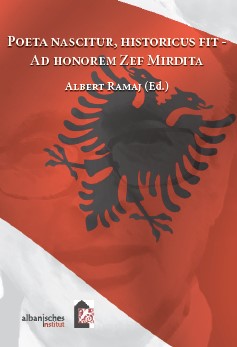
Kosovo ist je nach politischer und völkerrechtlicher Perspektive eine kleine Region oder (nach zunehmender internationaler Meinung und auch nach deutschem Rechtsstand-punkt) ein kleines Land im europäischen Südosten. Um seine knapp bemessene Fläche von weniger als 11.000 Quadratkilometern konkurrieren aber bis heute nicht bloß die Regierungen in Prishtina und in Belgrad. Auch die kosovoalbanische und die serbische Öffentlichkeit tun dies seit langem und in ihrem dominanten Mainstream unter völlig verschiedenen Prämissen.
More...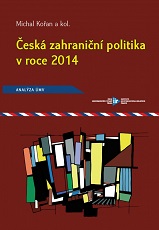
Od roku 2011 určuje zásadní směr a orientaci multilaterální agendy Koncepce za-hraniční politiky České republiky. Ta jasně ukázala, že multilateralismus sám o sobě není jednou z priorit naší zahraniční orientace, ale pouhým nástrojem dosahování jiných cílů. Toto neoliberálně instrumentální pojetí českého multilateralismu popsala zdárně Šárka Moravcová.
More...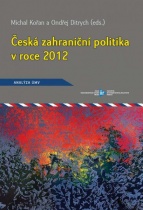
V roce 2012 pokračovala Česká republika ve vztahu k regionu Blízkého východu v naplňování koncepce zahraniční politiky ČR, která byla nově přijata v roce 2011. Ta do značné míry reagovala i na přijetí nové koncepce zahraniční politiky NATO , tudíž ČR zohlednila v rámci svých postojů i stanoviska Severoatlantické aliance. Základní principy zahraniční politiky ČR vůči dané oblasti zůstaly v porovnání s předchozím rokem neměnné. Hlavním zájmem i nadále zůstalo udržení pevných vztahů se Státem Izrael. Tento prioritní strategický zájem se tak také odrazil na postoji ČR vůči politickým změnám na Blízkém východě vyvolaným revoluční vlnou Arabského jara. Tento postoj tak byl spíše zdrženlivý a nepříliš flexibilní. Za příklad takovéto zdrženlivosti je možné uvést např. reakci ČR na změnu politického režimu v E gyptě v roce 2011, kdy až po delší prodlevě vyjádřila česká diplomacie podporu egyptské opozici. Ani v roce 2012 nebyl postoj českých politických elit k zásadním událostem v oblasti příliš aktivní. To mělo za následek absenci důrazně formulované pozice České republiky. Podobně ani české politické strany nedokázaly reagovat na řadu změn, jež poznamenaly blízkovýchodní země.
More...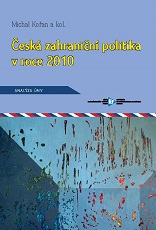
Česká zahraniční politika ve vztahu k Blízkému východu a Středomoří byla nucena v roce českého předsednictví mnohem více přihlížet k potřebám společné zahraniční a bezpečnostní politiky EU i k zájmům zvláště jihoevropských členských států. Reaktivní, spíše pasivní přístup minulých let byl nahrazen aktivnějším zájmem o region a hledáním konsenzuálního, celoevropského postoje ke klíčovým otázkám. To se poměrně dařilo s výjimkou rozporů kolem hodnocení a řešení krize v Gaze. Optika vládou vnímaných bezpečnostních rizik, spojených přímo či nepřímo s regionem, vycházela z Vojenské strategie ČR schválené v roce 2008, ale způsob, jak reagovat na potenciální hrozby, doznal změny, což bylo dáno několika faktory. S nástupem Obamovy administrativy došlo ke sblížení americko-evropských postojů a k ústupu USA od silové diplomacie.
More...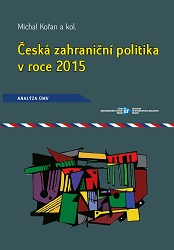
Uplynulý rok se v oblasti bezpečnostního a obranného rozměru české zahraniční politiky nesl zejména v duchu adaptace na pociťovanou proměnu bezpečnostního prostředí v souvislosti s ukrajinskou krizí a nově i výrazně sekuritizovanou problematikou utečenectví a nekontrolovaného tranzitu občanů cizích států přes území ČR. Na jedné straně tak mohl pokračovat trend k spíše pasivně konstruktivní tvorbě a realizaci české zahraniční politiky ve vztahu k jejímu okolí. Na straně druhé, normalizace, tedy široké přijetí představy o výjimečnosti současné bezpečnostní situace a nutnosti přijímat adekvátní, výjimečná opatření, přinesla nová rizika.
More...
Česká zahraniční politika ve vztahu k Ruské federaci (RF) byla v roce 2015, stejně jako o rok předtím v roce 2014, nadále ovlivněna napjatou geopolitickou situací mezi Ruskou federací a západními státy a nevyřešeným konfliktem na Ukrajině. Po eskalaci bojů na počátku roku 2015 došlo 12. února v Minsku k uzavření nových dohod, které měly doplnit minský protokol ze září roku 2014. Tyto dohody představovaly plán, jenž měl ke konci roku 2015 vést k vyřešení ozbrojeného konfliktu na východě země. Nicméně ke konci roku 2015 byl pokrok minimální. Sankce uvalené na Rusko, jejichž osud je pevně spojen s plněním dohod, byly tak prodlouženy, což ovšem v České republice nevyvolávalo takové debaty, jak tomu bylo v předcházejícím roce.
More...
V roce 2015 došlo poprvé od roku 2011 ke změně rozhodujícího hodnotového a strategického rámce multilaterální spolupráce, resp. celé české zahraniční politiky. Dne 13. července byla totiž schválena nová Koncepce zahraniční politiky České republiky. Ta navazuje na koncepci z roku 2011, stejně jako na programové prohlášení vlády, a snaží se reflektovat i změny ve světovém politickém řádu. Tato koncepce vymezila tři rozhodující globální cíle, které budou opět tvořit základní kostru obsahu této kapitoly: a) Bezpečnost; b) Lidská důstojnost a lidská práva a c) Prosperita a udržitelný rozvoj.
More...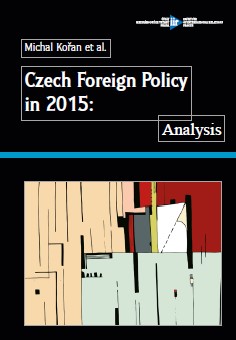
In 2015, the Czech foreign policy in its relation to the Russian Federation (RF), as in the previous year 2014, was still influenced by the tense geopolitical situation be-tween the Russian Federation and the western countries and the unresolved conflict in Ukraine. After the escalation of fights at the beginning of 2015, new agreements were signed in Minsk on 12th February, which were intended to supplement the Minsk Protocol from September 2014. These agreements represent the plan that, at the end of 2015, had to lead to the solution of the armed conflict in the eastern part of the country. However, the progress at the end of 2015 was only minimal. The sanctions imposed on Russia, the fate of which is tightly linked to the fulfillment of the agreements, were prolonged, but this did not cause such a debate in the Czech Republic as in the previous year.
More...
In 2015, the general principles of the Czech Republic foreign policy concerning the Middle East remained identical to the former years in the main points. According to the new Concept of the Foreign Policy of the Czech Republic, adopted in June 2015, the Czech Republic continued focusing on strengthening the bilateral economic relations with the countries in the region, particularly Israel, the Gulf countries, and North Africa with the aim to ensure stable security in the area. The bilateral priority remains the strategic partnership with Israel; however, the newly adopted concept binds the Czech Republic to strengthen the cooperation with the Palestinian administration and the preparation of the Palestinian representation to accept statehood. The new concept also highlights the necessity to standardise the relationships with Iran. Unlike those of the former years, the new concept reflects the aim of the left-wing government to support new bilateral partnerships in the region without priority focus on the interests of Israel.
More...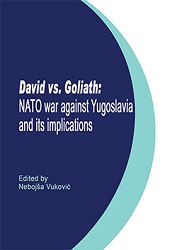
The paper is focused on the ideological frame of Russian Post-Soviet Foreign Policy in the Balkans. Is there any Russian soft power? In a short introduction, the main ideological and geopolitical tendencies in the presentday Balkans are outlined. In the first part of the paper, we describe the geopolitical reality of the Balkans today and Russian positions in it. In the second and the third part of the paper, we analyze the content and the transformation of the Russian idea/concept ‘Russkiy mir’ and geopolitical, ideological and spiritual consequences of that transformation. The fourth part of the paper describes the current state of relations between NATO and Serbia 20 years after the bombing of the FR Yugoslavia in the context of the geopolitical competition of old and new factors in world politics. The conclusion highlights the main geopolitical and spiritual challenges of some Balkan Orthodox peoples and the possible role of Russia in the Balkans.
More...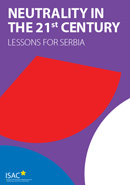
I have been asked to present at this opening panel some historical background information on the European neutrals in the Cold War. As we will talk more specifically about the experiences of individual neutral states tomorrow, I will mainly focus here tonight on the ideological and systemic conflict between the superpowers and on what this meant for the practice of neutrality during the period from 1945 to 1989.
More...
I will make an attempt to briefly present the key determinants and content guidelines of the Yugoslavian non-aligned policy, but also to indirectly indicate the contact points and differences between this policy and the concept of neutrality itself. After a period of uncritical glorification, followed also by euphoric satanization of the non-aligned concept, finally the time has come, based on relevant archive material, to provide real answers, at least to some elementary questions in this field. Some of them are: if this policy was in fact desired or forced; how difficult was it to prompt sometimes unwilling partners who were not belonging to neither of political-military blocks to cooperate, and finally, why Yugoslavia distanced itself from Europe and connected to far away and unknown civilizations.
More...